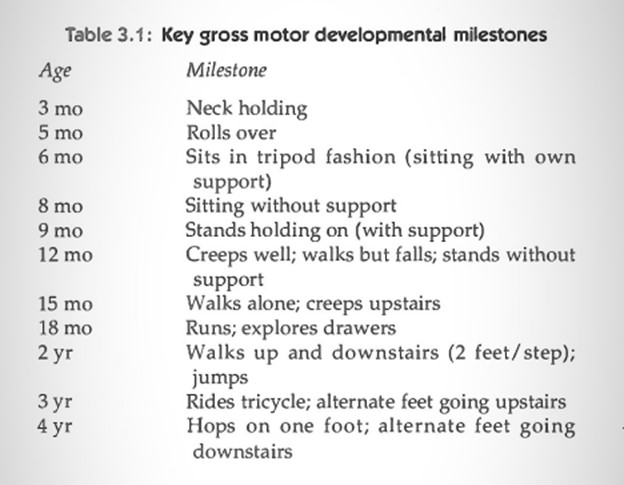A nurse is assessing a 15-month-old toddler. Which of the following findings should the nurse report to the provider?
The toddler cannot jump with both feet.
The toddler cannot build a tower of six to seven cubes
The toddler cannot stand upright without support
The toddler cannot turn a doorknob
The Correct Answer is C
By 15 months of age, toddlers typically develop the ability to stand and maintain balance without support. This milestone is an important indicator of gross motor development. Not being able to stand upright without support at this age may suggest a delay or impairment in motor skills, and further evaluation may be needed to determine the underlying cause.
The other findings mentioned—difficulty jumping with both feet, inability to build a tower of six to seven cubes, and inability to turn a doorknob—are within the expected range of development for a 15-month-old toddler. While some children may already demonstrate these skills, others may acquire them later in their developmental journey. It is important to consider individual variations in development, but the inability to stand without support should be further assessed.

Nursing Test Bank
Naxlex Comprehensive Predictor Exams
Related Questions
Correct Answer is ["C","D","E"]
Explanation
Head lag is not commonly noted in infants at age 6 months. By this age, infants should have developed good head control and should not exhibit significant head lag when pulled into a sitting position.
A 6-month-old infant typically has developed the ability to hold objects and grasp them with their hands, so they should not have trouble holding objects at this stage of development.
Correct Answer is A
Explanation
At this age, toddlers enjoy exploring objects and are developing their motor skills, so large building blocks would be an appropriate toy choice. Hanging crib toys may be too limiting in terms of exploration, and modeling clay may not be safe due to the risk of ingestion. Crayons and a coloring book may be appropriate for older children, but at 12 months, the child's fine motor skills are still developing.
Whether you are a student looking to ace your exams or a practicing nurse seeking to enhance your expertise , our nursing education contents will empower you with the confidence and competence to make a difference in the lives of patients and become a respected leader in the healthcare field.
Visit Naxlex, invest in your future and unlock endless possibilities with our unparalleled nursing education contents today
Report Wrong Answer on the Current Question
Do you disagree with the answer? If yes, what is your expected answer? Explain.
Kindly be descriptive with the issue you are facing.
